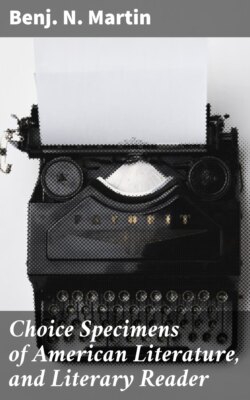Читать книгу Choice Specimens of American Literature, and Literary Reader - Benj. N. Martin - Страница 65
На сайте Литреса книга снята с продажи.
=34.= THE CHURCH A TEMPLE.
ОглавлениеIn surveying the past, we observe a beautiful fitness and an enchanting variety in the materials which have been already built into that part of the edifice which has thus far been reared. How unlike the corps of prophets to the corps of apostles; and how unlike the several individuals of each. We have Scripture authority for placing these among the most honorable and sustaining parts of the fabric, near the corner-stone: for we are "built upon the foundation of the apostles and prophets." Isaiah with his evangelic clarion. Jeremiah with his pastoral reed of sorrows, and David with his many-voiced harp, sometimes loud in notes of triumph, and sometimes subdued to the voice of weeping, stand out with a marked individuality which becomes the more surprising, the more nearly we examine the distinctive features. They may be likened to those immense but goodly stones, carried up in courses, along the precipitous side of the valley, to form the basis for the temple of Solomon. The twelve apostles, including the last, and humanly speaking, the greatest, though brethren, how unlike. Who for an instant, could mistake Paul for Peter, or either of them for John. They occupy salient angles of the great foundation, and lie nearest to the corner-stone, elect and precious. Some of their brethren, though not visible in the front which meets the eye, may have done equal service in the bearing up of the mass. Martyrs and confessors found their place, in succeeding ages, as the wall advanced; some as glorious for ornament as strong for use. When love needed a signal display, amidst the blood of martyrdom, we see it immortalized in an Ignatius and a Polycarp. When stalking heresy needed a front of steel to stand unmoved against all its columns, we find an "Athanasius against the world." When the language of Greece is to be elevated to new dignity by conveying the wonders of Christianity, we hear the golden eloquence of a Basil and a Chrysostom. When Roman philosophy had died out of the world, we behold it revived in an Augustine, the father of the fathers. Later down in ages, we catch glimpses even amidst Romish corruptions of a Bernard and a Kempis. The note of alarm is given to a sleeping carnal church, first by Wicliff, Huss, and Jerome, then by Zwingle, Luther, Calvin, and Knox.
* * * * *
=Martin John Spaulding,[11] 1810–1872.=
From "Sketches of the Early Catholic Missions in Kentucky."
